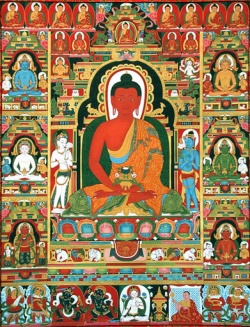Dharmākara
Click here to see other articles relating to word Dharmākara
Dharmakara Term Image (Dharmākara)
(Language: Sanskrit)
Alternate Spellings: Dharmakara 法蔵比丘 (Skt; Jpn Hozo-biku) Dharmakara The Bodhisattva who later became Amitabha Buddha, as related in the Longer Amitabha Sutra. The Bodhisattva Dharmakara is famous for forty-eight Vows, particularly the eighteenth, which promises rebirth in the Pure Land to anyone who recites His name with utmost sincerity and faith at the time of death. A bodhisattva described in the Buddha Infinite Life Sutra who is identified as Amida Buddha before he became a Buddha and was still engaged in bodhisattva practice.
See Dharma Treasury.
Short Description: Sanskrit name for the Bodhisattva who established a place where all beings can attain Enlightenment.
Long Description: Sanskrit name for the Bodhisattva who through five aeons of practice perfected his Vows to establish an ideal land where all beings can easily attain Enlightenment. On completion of his Vows he became Amida Buddha and established the western Pure Land. Dharmakara Bodhisattva established and fulfilled the special Vow to save all sentient beings and become Amida Buddha. While the other Buddhas help people who accumulate meritorious deeds, practice meditative activities, and perfect wisdom,
In the Longer Sukhāvatīvyūha Sūtra, the Buddha begins by describing to his attendant Ānanda a past life of the buddha Amitābha. He states that in a past life, Amitābha was once king who renounced his kingdom, and became a bodhisattva monk named Dharmākara ("Dharma Storehouse"). Under the guidance of the buddha Lokeśvararāja ("World Sovereign King"), innumerable buddha-lands throughout the ten directions were revealed to him. After meditating for five eons as a bodhisattva, he then made a great series of vows to save all sentient beings, and through his great merit, created the realm of Sukhāvatī ("Ultimate Bliss"). This land of Sukhāvatī would later come to be known as the Pure Land (Ch. 淨土) in Chinese translation.
